The Universe Inside: An Interview with Alana Rocklin
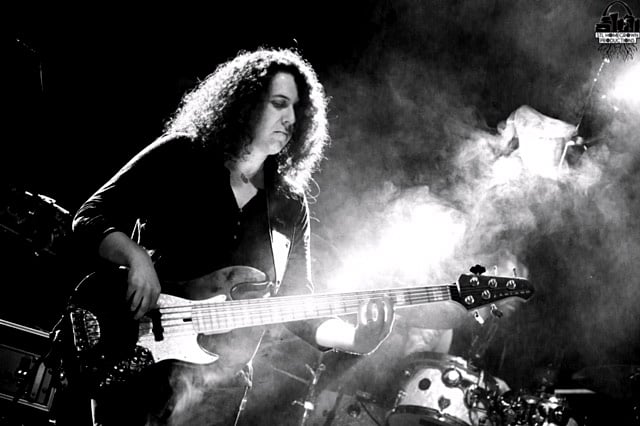
Veteran electronic jam band STS9’s latest release, The Universe Inside, is something new for the band. It’s their first full-length LP in nearly seven years and features more vocal songs than their typically instrumental output. It’s more influenced by pop of the ’70s and ’80s. It’s also the first to be anchored by bassist Alana Rocklin, who lays down fierce grooves for the album’s foundation.
She joined the group in 2014 after founding member David Murphy’s departure. Based in Nashville, Rocklin has a diverse musical background and impressive resumé. She studied bass at the University of Michigan and eventually made her way to Music City, where she has worked as a session musician for several years. Jazz, classical, rock, hip hop, and more are all just shades of her extensive musical knowledge.
We caught up with Rocklin during pre-production for their upcoming tour to get the scoop on the The Universe Inside, learning lots of songs, and how to keep extended jams interesting.
You’ve been in the band for a couple years and this is your first studio album with them, though you’ve been gelling in live situations. How do you bring that kind of magic into the studio?
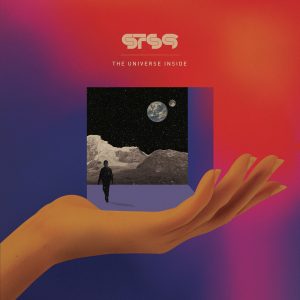 We’re really conscious of that. We spent a year and a half or so playing together and just developing our vibe as a band. We had been recording from the beginning of when I joined the band, but we decided that we really wanted to capture what we had been developing at our shows. We started the record over [after working on it], in fact, and decided we wanted to record it together. [We wanted to] capture the feeling of what it feels like to be at a show so that when people heard the record they could really envision us playing, even though we had this really big goal of making the record even more intense than what we would play live. We really wanted to raise the standard.
We’re really conscious of that. We spent a year and a half or so playing together and just developing our vibe as a band. We had been recording from the beginning of when I joined the band, but we decided that we really wanted to capture what we had been developing at our shows. We started the record over [after working on it], in fact, and decided we wanted to record it together. [We wanted to] capture the feeling of what it feels like to be at a show so that when people heard the record they could really envision us playing, even though we had this really big goal of making the record even more intense than what we would play live. We really wanted to raise the standard.
We put a lot of thought as to how we could do it. Then one day we just decided that we needed to record together. We did it at our studio in Santa Cruz with Brad Bowden, who is my husband. He’s an amazing engineer and producer in his own right. So we started recording the tracks again. We started to really get into a groove in the studio and we’re so thrilled with how it turned out in terms of the sound that we developed live and capturing it.
What happened during the making of the album that made it have the message that it does?
The album is definitely a concept album in that it has a story that goes throughout. We wanted to capture this notion that we were coming back from a mission and trying to spread this message of love and unity throughout the record. It unfolds as you listen to its entirety. The songs that we were writing developed over a really long period of time. We were just recording in a really casual way. [We were] writing these songs and putting parts down and seeing what worked and listening back. Throughout that process certain songs just emerged as the ones that we really wanted to go in on and focus on. We wrote a ton of stuff for the record, some of which we even played live but didn’t make the record. We have more songs that we finished that no one’s ever heard that didn’t make the record, too, so we spent a lot of time just workshopping that.
Through that process we realized the most important thing we were missing was the live aesthetic. We wanted to make these songs breathe the way they do in the live way, but just with this elevated production element. It was really a long time that we took. The band went through a lot. I came into the band, and that’s a big change for any band that’s been together for going on 20 years. We really wanted to give ourselves the time to get to know one another deeper musically and let that happen naturally instead of going into the studio and feeling the pressure like we needed to finish a record before we really figured out how we played together. So I think it was a long process, but well worth it because we’re really so thrilled with how it turned out and feel that it represents exactly what we were trying to say.
It’s very positive in the lyrics, but it’s also very positive in the musical vibe. I feel like I heard some Chic and Bernard Edwards-style lines coming through. Were you all drawing inspiration from them?
Yeah. We even said in our bio, just to make the point of how important that is, that the album is dedicated to all those records and musicians that inspired us throughout that time. Whether it be Michael Jackson or Chic. We were actually listening to a lot of that era stuff during that time and the production level and the intricacy of that music and the notion that a record is really a journey. A lot of those records had that quality to them. We definitely were looking to that for inspiration throughout the recording.
Could you tell us how you tracked the bass? What bass did you use?
I’ve been playing Lakland bass for a long time. The main bass I like to play is a 55-94 U.S. model from 1999. It was one of two basses that they made that was a special edition bass. It has this incredible tone that is unsurpassed in anything that I own. That’s all I played on the entire record. I used a JHS Color Box and a really nice chain that Brad had me going through. I just went straight bass. There’s really not anything special that I did other than just use that bass to its best ability. I did play upright on a couple of tracks on the record. I have an old King bass that I played.
I found it interesting that you studied in college with Stuart Sankey and Rodney Whitaker. When you were going to school, did you want to become a jazz or classical player or did you just have the idea that you wanted to build your chops so you could play rock and anything else?
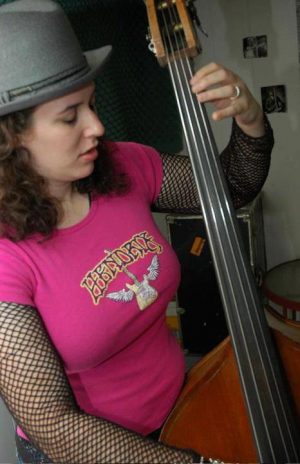 That’s a great question. Well, I graduated from the University of Michigan with a degree in jazz improvisation, but I originally went there to study classical music with Stuart Sankey, thinking that I wanted to pursue a career in an orchestra. A year into it I discovered that I was an improvisor at heart, so I switched my major and started studying jazz really intensely. I hadn’t had any experience with jazz before I got to Michigan, to be totally honest. I played classical music and I played electric bass on rock and funk and stuff like that. I never got into jazz [until college] and then I got bitten by the bug really hard. Reggie Workman was teaching at the time, and he was an incredible inspiration. Shortly after that, Rodney Whitaker came and he just took my playing to a whole new level.
That’s a great question. Well, I graduated from the University of Michigan with a degree in jazz improvisation, but I originally went there to study classical music with Stuart Sankey, thinking that I wanted to pursue a career in an orchestra. A year into it I discovered that I was an improvisor at heart, so I switched my major and started studying jazz really intensely. I hadn’t had any experience with jazz before I got to Michigan, to be totally honest. I played classical music and I played electric bass on rock and funk and stuff like that. I never got into jazz [until college] and then I got bitten by the bug really hard. Reggie Workman was teaching at the time, and he was an incredible inspiration. Shortly after that, Rodney Whitaker came and he just took my playing to a whole new level.
I don’t think I had an intention of being a jazz musician. I just knew that I wanted to play for a living and that I was going to try my hardest to do that. I had a band in Michigan in Ann Arbor at the time. We were pursuing that. When I left [Michigan], that band moved to Chicago and we did that for a while. Then, funny enough, I met Victor Wooten at his Bass/Nature Camp in 2000. I’m from Nashville originally, and after that inspiration I decided to move back to Nashville and pursue a freelance career. I had been friends with the guys from STS9 through that entire time. I was always in a band of my own. That was something that I learned at Michigan: You should always be working on your own music, writing your own music, no matter what you’re doing. So I always had bands. Brad and I connected with STS9 in 2001, and we just remained really close with them the entire time. It was sort of this natural thing where I always had a band but I also had this whole other career of being a hired gun freelance bass player. That’s kind of how it all happened.
That gets you some awesome credits. You’ve gotten to play some hip hop, in there, too.
I played on Rick Ross’s song “Maybach Music IV”. I also played on another track on that album, “Sixteen”. It’s a really crazy track. I’ve toured with Jim James from My Morning Jacket and his solo band. I was in Nanci Griffith’s touring band for a while. My first gig in Nashville that was my first touring gig was with Jeff Coffin and his band the Mu’Tet.
That’s such a high level of musicianship you have to step into.
That’s Nashville, man! [laughs] There are amazing musicians everywhere.
You’re gearing up for this pretty expansive tour, and this is kind of the nature of this type of band. How do you prepare for a tour?
I try to practice every day. My main thing is to make sure that my stamina is up for it. We play very long shows and it’s a lot of bass playing. If I’m not practicing every day leading up to it, I really notice it, so I try to keep it up.
The other thing is that during the tour we might play over 100 unique songs. We try to change our show nightly and we have a really amazing relationship with our fans. There are so many songs and they want to hear stuff from the beginning up to now. I’m constantly learning STS9 songs and making sure I am referencing all different years and versions of each song to study it in this really deep way.
Do you have any tips on how you keep up on all of those, or is it just upkeep?
I think one thing about being a musician that gets hired for so many different people is that you develop this ability to learn songs really fast. It didn’t start out that way. Most people don’t [learn songs quickly] because you have to work up to it. I went through a period when I was first working in Nashville that it took me a long time to learn songs. As I did it for years and years and years, I got to this place where instead of charting out songs and keeping files for artists, I found that it hindered me from memorizing or internalizing some of the music. I got to this point where I was really fast at learning songs that I decided I wasn’t going to write them down anymore.
With STS9 from the get go, that was my strategy. I was just going to listen and study the music and internalize it so I would never feel like I had to look at a chart on stage. That skill developed over a really long time, though. I would say for anybody else that you should write down songs. I think it’s great to learn how to chart songs, especially if you have to communicate them to other people. It’s one of those things for me personally, I love to memorize things and internalize it.
When you’re playing these extended jams, how to you sustain it and keep it interesting?
That’s a great question, and there’s no one real answer. I think it’s dependent upon who you’re playing with and what they’re contributing. In STS9, we try to make the improvisation a conversation where it’s not really any one person soloing necessarily, but it’s conversing. At one moment we might be in a really deep conversation and in another moment we might be in an excited fast conversation. I try to just let the music and what other people are doing guide me. As a bass player, you have this immense responsibility to lead the band in this way. I try to really keep my ears open and listen and let that guide me more than I try to control what the improvisation is.
The other thing that we try to do is compose on the spot. Not necessarily jam, though I think people might define it as jam. In our minds, we’re trying to make a new composition based on the song. We’re trying to create melodies and space for that to occur. It’s a really unique and fun way to improvise the way we do. It’s not about soloing, it’s not about making changes in a certain way. It’s about the conversation. That also has a lot to do with the crowd and the energy that they’re giving and what we’re giving back. It gets to be this really amazing circular thing.
My advice to anyone about how to get to that place with your improvisation: fundamentals. Always. I still practice scales every day and I still practice making sure my time is good. I’m working on my time at all times and making sure I’m honoring the tradition of the bass. If you do that, it’s amazing how your listening and your ability to just react in the moment becomes so much easier.
STS9 Fall 2016 Tour Dates:
| Date | Venue | Location |
|---|---|---|
| Sep 9 - 10 | Red Rocks Amphitheatre | Morrison, CO |
| Sep | Red Rocks Amphitheatre | Morrison, CO |
| Oct 20 | Skyway Theatre | Minneapolis, MN |
| Oct 21 | Orpheum Theater | Madison, WI |
| Oct 22 | The Fillmore | Detroit, MI |
| Oct 23 | Express Live! | Columbus, OH |
| Oct 26 | Mercury Ballroom | Louisville, KY |
| Oct 27 | New Daisy Theatre | Memphis, TN |
| Oct 28 | Oak Mountain Amphitheatre | Birmingham, AL |
| Oct 28- 30 | Voodoo Music Festival | New Orleans, LA |
| Oct 28- 30 | Suwannee Hulaween | Live Oak, FL |
| Oct 31 | Georgia Theatre | Athens, GA |
| Nov 3 | War Memorial Auditorium | Nashville, TN |
| Nov 4 | Tennessee Theatre | Knoxville, TN |
| Nov 5 | Thomas Wolfe Auditorium | Asheville, NC |
| Nov 6 | Jefferson Theater | Charlottesville, VA |
| Nov 9 | The NorVa | Norfolk, VA |
| Nov 10 | The Fillmore | Silver Spring, MD |
| Nov 11 | The Fillmore | Philadelphia, PA |
| Nov 12 | Terminal 5 | New York, NY |
| Nov 01 - Dec 5 | Dominican Holidaze | Punta Cana, DR |

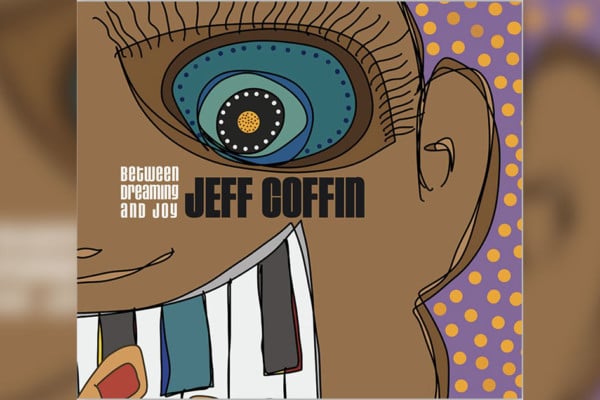
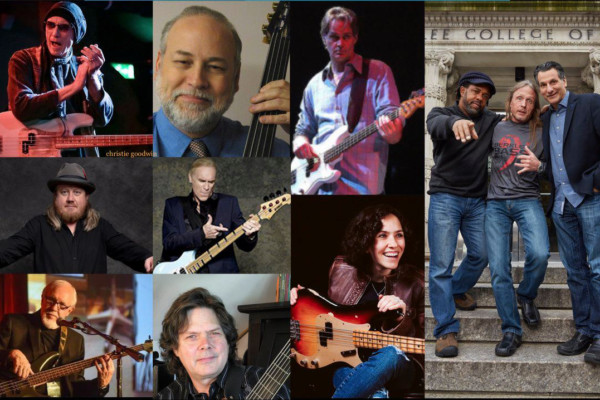
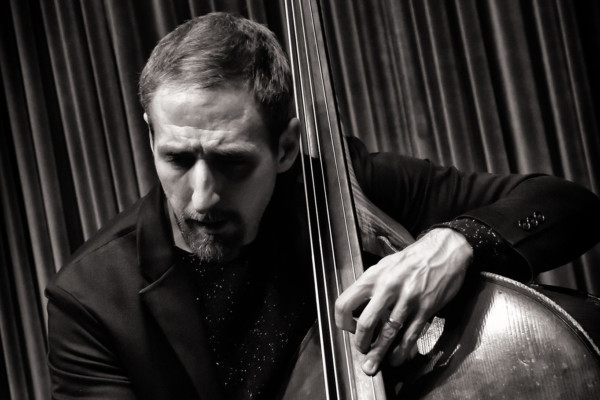
Love me some tribe. I wasnt sure about Alana at first, but after hearing a couple shows with her i was sold!